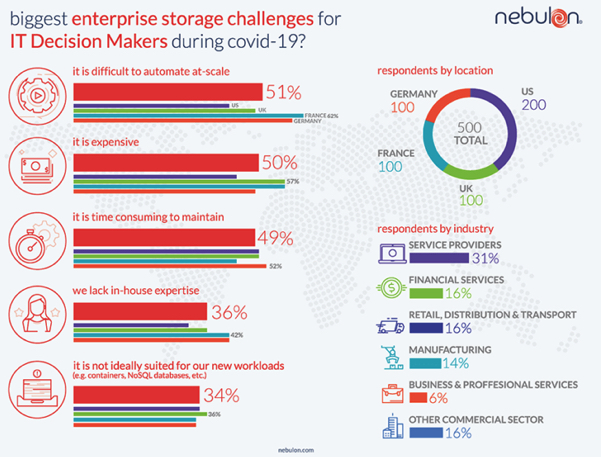Limitations Traditional IT Infrastructure Imposes
Exacerbated by remote workforce
This is a Press Release edited by StorageNewsletter.com on August 7, 2020 at 2:11 pmNebulon, Inc., in cloud-defined storage, released the results of an independent survey completed by IT decision makers at 500 companies in the IT, financial services, manufacturing, retail, distribution and transport industries across the US, UK, Germany and France.
Conducted in June 2020, the survey exposes the biggest challenges enterprises face in transforming their on-premises application storage environments, which have only been exacerbated during this Covid-19 era.
While IT organizations cite multiple restrictions, the survey reveals limited infrastructure automation and high Capex as the most significant challenges for those deploying enterprise storage array technology, forcing them to reexamine IT spending and operations even more so than usual amidst the pandemic.

While increasing automation and reducing costs may seem like mainstream initiatives for any large organization, the pandemic and resulting workforce restrictions mandate significant progress in days or weeks, vs. months or quarters.
The results of the survey, undertaken by Vanson Bourne Ltd, further reinforce this as respondents also highlighted their on-premises application storage environments are difficult to maintain, and reveal that they lacked the in-house expertise necessary to manage them. Even more disconcerting, respondents indicate that their traditional external storage arrays are not suited to handle new workloads, including containers and NoSQL databases. This is unsurprising as modern workloads have been architected for local vs. shared storage resources.
“The impact of the pandemic is forcing CIOs worldwide to reconsider their operations,” said Siamak Nazari, co-founder and CEO. “Reducing costs through server-based storage alternatives without the restrictions of HCI, and reducing operating cost pressure through cloud-based management of the application storage infrastructure are crucial initiatives for IT organizations looking to survive this new normal.”
For companies with a growing class of mission-critical data that cannot or should not move to the public cloud, cloud-defined storage is an alternative to expensive storage arrays, offering enterprises a cloud-managed, server-based approach for mission-critical storage.
By combining a cloud-based control plane, called Nebulon ON, with server-based storage that is powered by the Nebulon Services Processing Unit (SPU), the firm enables organizations to reduce cost for enterprise storage by up to half without compromising on enterprise data services. This is made possible by its architecture that makes use of commodity SSDs in industry standard servers, Ethernet in favor of FC, and by eliminating operational complexities by moving management to Nebulon ON with an as-a-service model.
Nebulon ON uses AI to analyze application workloads during operations, provides actionable recommendations for IT organizations and provides a single API endpoint that greatly streamlines automation at-scale. Customizable application templates, tailored for customer’s application clusters, eliminate the guesswork in configuring infrastructure and produce repeatable, reliable infrastructure services for modern, mission-critical workloads. With the architectural and operational simplicity of cloud-defined storage, application owners gain a self-service infrastructure provisioning that is unmatched with existing on-premises storage solutions.
“IT organizations have been seeking a cost-effective alternative to external storage arrays for years,” said Nazari. “With our cloud-defined storage offering, they finally have the opportunity to reduce costs while also deploying a self-service solution for application owners that also reduces the operational burden.”
Read also:
Nebulon Emerges From Stealth to Announce Cloud-Defined Storage
Providing on-premises, server-based enterprise storage defined and managed through cloud [with our comments]
June 23, 2020 | Press Release









 Subscribe to our free daily newsletter
Subscribe to our free daily newsletter

